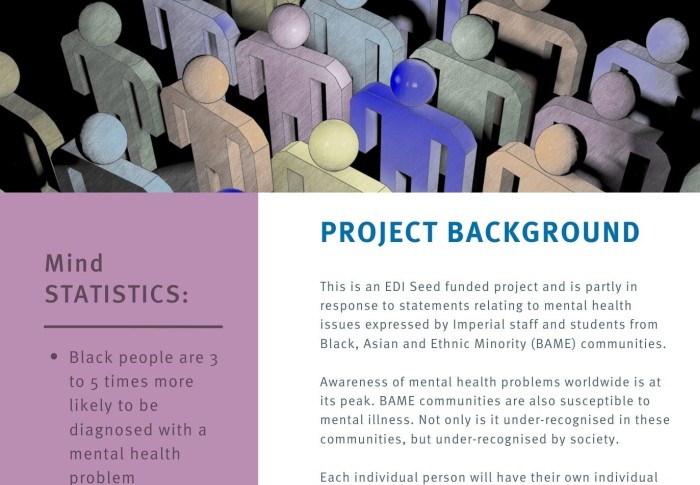Workshop breaks silence around racial mental health inequalities
by Jan Carberry

An extract from the workshop leaflet
A seed-funded workshop has proved successful in raising recognition of mental health awareness in Black, Asian and Minority Ethnic communities.
This spring 123 staff were able to attend a workshop dedicated to mental health awareness in Black, Asian and Minority Ethnic (BAME) communities thanks to funding made available to meet College strategic priorities.
Black, Asian and Ethnic Minority mental health: How to support people from BAME communities was funded by £3,335. Five half day workshops were held in March, April and May. The sessions were delivered by IRIE Mind, an autonomous organisation hosted by mental health charity Mind in City of London, Hackney and Waltham Forest. The Estates Operations Learning and Development Officer Angela Williams was behind the application for the funding, having identified a need for training. She worked with the Equality, Diversity and Inclusion Centre to bring about the successful application for funds.
IRIE Mind state: “Mental health is under-recognised within Black, Asian and Minority Ethnic communities (BAME) communities and also under-recognised by society.” Angela said: “The aims of these workshops were to raise awareness of how the impact of racism, mental health stigma and inequalities contribute to the poor mental health of BAME communities. It was to highlight some of the BAME mental health statistics which has increased over the years including the suicide rate of Black teens; the barriers accessing services and mental health support. The workshops would also help people to feel more confident starting mental health conversations, have an awareness of treatments available and where to signpost for support.”
The course aimed to equip delegates – mainly first line staff and student-facing post holders, such as security and residential wardens, along with Mental Health First Aiders and senior managers – with ways to encourage and enable people to access help and support.
Course content included:
1) Impact of issues such as racism and discrimination - why history matters
- Important influences on BAME communities’ mental health
- Racism and discrimination
- Social and economic inequalities
- Mental health stigma, taboo, and shame
- Criminal justice system
- Other factors
2) Different BAME groups and particular mental health concerns
- Black / African / Caribbean / Black British people
- Asian/ Asian British
- Other ethnic groups
3) Culturally appropriate treatment and interventions
4) Ten ways to encourage someone to access support.
Take-up of places on the course was encouraging. The majority of those who attended - 57% - did not identify as BAME. So too was the feedback and evaluation, rating the course content and delivery by trainer Nichola Lauder highly. Typical of comments were: “Presentation was first-rate. A lot of sharing of personal experiences, which made it all seem very ‘real’,” and “This was probably the best training course I've attended in the last 12 months. It was relevant, informative, interesting and would highly recommend to others.”
Where there was criticism, if it can be called that, it was mainly that people wanted more – more time to discuss the issues that arose and more detail with which to expand their knowledge and more of a toolkit to take away.
The feedback helped form clear recommendations including:
- The inclusion of the training in the EDI annual course programme and as part of the EDI Strategy
- Extending the course to a full day course to include more time for practical exercises, case studies and discussions
- Face-to-face delivery, if possible
- To prioritise target groups - MHFA, staff supporters, line managers and staff and student facing staff
- To tailor the course for Imperial College and to offer at different levels/groups eg. non-MHFA and senior leadership teams.
Angela gave many hours of her personal time helping to bring the course to College and making a mental health music video which was released to coincide with Mental Health Awareness Week in May. The video, ‘Sick and Tired’ also highlighted some of the stats and taboos surrounding BAME mental health supporting the course content.
Professor Stephen Curry, Assistant Provost for Equality, Diversity and Inclusion said: “I would like to congratulate Angela Williams for creating and delivering such an important and impactful project, one that is helping us to better understand and address the mental health challenges of staff and students from ethnic minority backgrounds.”
About the Seed Fund
The Equality Diversity and Inclusion (EDI) Seed Fund offers £10,000 each year to help people implement creative and progressive ideas. helping to build a fully inclusive institutional culture at Imperial.
In 2020-21 there were 23 applications in total, requesting funding that was four times the original budget covering the full range of EDI issues. Of those 12 were successful in receiving funding. This course was one of six funded through the College's Strategic Priorities Fund.
Article text (excluding photos or graphics) © Imperial College London.
Photos and graphics subject to third party copyright used with permission or © Imperial College London.
Reporter
Jan Carberry
Estates Division